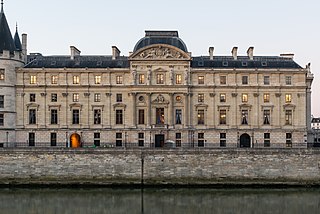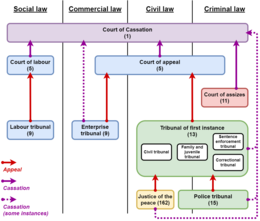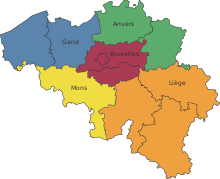
The Court of Cassation is the supreme court for civil and criminal cases in France. It is one of the country's four superior courts, along with the Council of State, the Constitutional Council and the Jurisdictional Disputes Tribunal.

A tribunal, generally, is any person or institution with authority to judge, adjudicate on, or determine claims or disputes—whether or not it is called a tribunal in its title. For example, an advocate who appears before a court with a single judge could describe that judge as "their tribunal". Many governmental bodies are titled "tribunals" to emphasize that they are not courts of normal jurisdiction. For instance, the International Criminal Tribunal for Rwanda was a body specially constituted under international law; in Great Britain, employment tribunals are bodies set up to hear specific employment disputes.

France's independent court system enjoys special statutory protection from the executive branch. Procedures for the appointment, promotion, and removal of judges vary depending on whether it is for the ordinary or the administrative stream. Judicial appointments in the judicial stream must be approved by a special panel, the High Council of the Judiciary. Once appointed, career judges serve for life and cannot be removed without specific disciplinary proceedings conducted before the council with due process.

The Palace of Justice of Brussels or Law Courts of Brussels is a courthouse in Brussels, Belgium. It is the country's most important court building, seat of the judicial arrondissement of Brussels, as well as of several courts and tribunals, including the Court of Cassation, the Court of Assizes, the Court of Appeal of Brussels, the Tribunal of First Instance of Brussels, and the Bar Association of Brussels.

The Supreme Court of the Netherlands, officially the High Council of the Netherlands, is the final court of appeal in civil, criminal and tax cases in the Netherlands, including Curaçao, Sint Maarten and Aruba. The Court was established on 1 October 1838 and is located in The Hague.

The Court of Cassation of Belgium is the supreme court of the Belgian judiciary. The court is composed of thirty judges with life tenure who are nominated by the High Council of Justice of Belgium and appointed by the Belgian federal government. The court handles cases in the two main languages of Belgium, Dutch and French, and provides certain facilities for cases in German. The court is assisted in its work by a public prosecutor's office and a bar association, which both function separately from other structures. The duty of the public prosecutor's office is to provide advisory opinions to the court on how the law ought to be interpreted and applied. The attorneys of the court's bar association assist litigants in proceedings before the court; in certain cases, their assistance is mandatory.

In most legal jurisdictions, a supreme court, also known as a court of last resort, apex court, and highcourt of appeal, and court of final appeal, is the highest court within the hierarchy of courts. Broadly speaking, the decisions of a supreme court are binding on all other courts in a nation and are not subject to further review by any other court. Supreme courts typically function primarily as appellate courts, hearing appeals from decisions of lower trial courts, or from intermediate-level appellate courts. A supreme court can also, in certain circumstances, act as a court of original jurisdiction.
In France prior to 2020, the Tribunal d'instance was a judicial lower court of record of first instance for general civil suits and included a criminal division, the Police Court, which heard cases of misdemeanors or summary offences (contraventions). Since it had original jurisdiction, the Court's rulings could be appealed to a French appellate court or Supreme Court. Prior to 1958, the court was known as a Justice of the Peace Court until the judicial restructuring of 1958.

The tribunals of first instance are the main trial courts in the judicial system of Belgium. The tribunals of first instance are courts of general jurisdiction; in the sense that they have original jurisdiction over all types of cases not explicitly attributed to other courts. They handle a wide range of civil cases, criminal cases, and cases under the scope of juvenile law and family law. They also hear appeals against the judgements of the police tribunals and justices of the peace. The judgements of the tribunals of first instance can be appealed to the courts of appeal in turn. There is a tribunal of first instance for each of the twelve judicial arrondissements ("districts") of Belgium, except for the arrondissement of Brussels. The arrondissement of Brussels has two tribunals of first instance, a Dutch-speaking one and a French-speaking one, due to the sensitive linguistical situation in the area. The territories of the current judicial arrondissements largely coincide with those of the provinces of Belgium. Most of the tribunals of first instance have multiple geographical divisions, with each having their own seat. As of 2020, the 13 tribunals of first instance have 27 seats in total. Further below, an overview is provided of all seats of the tribunals of first instance per arrondissement.

The police tribunal is the traffic court and trial court which tries minor contraventions in the judicial system of Belgium. It is the lowest Belgian court with criminal jurisdiction. There is a police tribunal for each judicial arrondissement ("district"), except for Brussels-Halle-Vilvoorde, where there are multiple police tribunals due to the area's sensitive linguistic situation. Most of them hear cases in multiple seats per arrondissement. As of 2018, there are 15 police tribunals in total, who hear cases in 38 seats. Further below, an overview is provided of all seats of the police tribunal per judicial arrondissement.

The courts of appeal are the main appellate courts in the judicial system of Belgium, which hear appeals against judgements of the tribunals of first instance, the enterprise tribunals and the presidents of those tribunals in their judicial area. There are five courts of appeal for each of the five judicial areas, which are the largest geographical subdivisions of Belgium for judicial purposes. The division of the Belgian territory into the five judicial areas is laid down in article 156 of the Belgian Constitution. A judicial area covers multiple judicial arrondissements ("districts"), except for the judicial area of Mons. Each arrondissement has a tribunal of first instance. Further below, an overview is provided of the five courts of appeal and the judicial arrondissements their judicial area covers. The courts of appeal do not hear appeals against judgements of the labour tribunals; these are heard by the courts of labour.

The court of assizes is the trial court which tries the most serious crimes in the judicial system of Belgium. It is the highest Belgian court with criminal jurisdiction; as such, it is the only Belgian court that can sentence someone to life imprisonment. The courts of assizes are not permanent courts; a new court of assizes is assembled for each new trial. There is a court of assizes in each of the ten provinces of Belgium, as well as one in the arrondissement of Brussels-Capital which is not part of any province. Further below, an overview is provided of the eleven courts of assizes and their seats. They are the only courts in Belgium for which the provinces are used as territorial subdivisions. They are also the only courts in Belgium that hold jury trials. The jury acts as sole trier of fact, but decides on the penalty together with the judges. The trial by jury of certain crimes is laid down in article 150 of the Belgian Constitution. The Belgian courts of assizes have the same origin as their French namesakes.

The legal system of Belgium is based on the Napoleonic code. The Napoleonic code is the French civil code which was issued between 1804 and 1810. It clearly presents the French legal system. Belgium’s constitution is influenced by earlier constitutions of the French and the Netherlands. Belgium is one of a few countries in the world where defendants are often denied the right to defend themselves. Belgium became an independent state in 1830 with the help of British government and there were restrictions on the parliamentary system of Belgium government. The language differences in Belgium have caused governmental and constitutional problems. Official languages are French, Dutch and German, which has official status in one district only. Parliamentary democracy usually ends up becoming a coalition government. Belgium is a federal state and has a civil law system.

The justice of the peace is the small claims court in the judicial system of Belgium, and stands at the bottom of the Belgian judicial hierarchy. There is a justice of the peace for each judicial canton, which is the smallest geographical subdivision of Belgium for judicial purposes. Most judicial cantons cover multiple municipalities, except in the case of larger towns and cities, which are often divided into multiple judicial cantons. A judicial canton has an average population of 50,000 to 60,000 people, but some have a population as low as 30,000 people or as high as 100,000 people. The justices of the peace only have jurisdiction over their own canton. As of 2017, there are 187 cantons with as many justices of the peace in Belgium, who hear cases in 229 seats.

The judiciary of Belgium is similar to the French judiciary. Belgium evolved from a unitary to a federal state, but its judicial system has not been adapted to a federal system.
The judiciary of Luxembourg comprises a number of courts.

In France, a cour d’appel of the ordre judiciaire (judiciary) is a juridiction de droit commun du second degré, an appellate court of general jurisdiction. It reviews the judgments of a tribunal judiciaire. When one of the parties is not satisfied with the trial court’s judgment, the party can file an appeal. While decisions of a court of first instance are termed "jugements" in French, a court of appeals hands down an arrêt, which may either affirm or reverse the judgment of the court below. An arrêt (judgment) of the court of appeals may be further appealed en cassation. If the appeal is admissible at the cour de cassation, that court does not re-judge the facts of the matter a third time, but may investigate and verify whether the rules of law were properly applied by the lower courts.
The Belgian Judicial Code is a code of law in the country of Belgium, formally adopted on 10 October 1967 and currently still in force. The Judicial Code governs the organisation of the courts and tribunals of the Belgian judiciary, their jurisdiction, as well as the applicable rules of civil procedure. As such, the Judicial Code is one of the important codes of law in the Belgian legal system.
The Belgian Code of Criminal Procedure is a code of law in the country of Belgium, of which the different parts were formally adopted in November and December 1808. The code is currently still in force. The Code of Criminal Procedure governs the powers and duties of judicial police attributed to certain public and judicial officers, the manner in which to conduct criminal investigations and prosecutions, as well as the criminal jurisdiction of the courts and tribunals of the Belgian judiciary and the applicable rules of criminal procedure. As such, the Code of Criminal Procedure is one of the important codes of law in the Belgian legal system.












